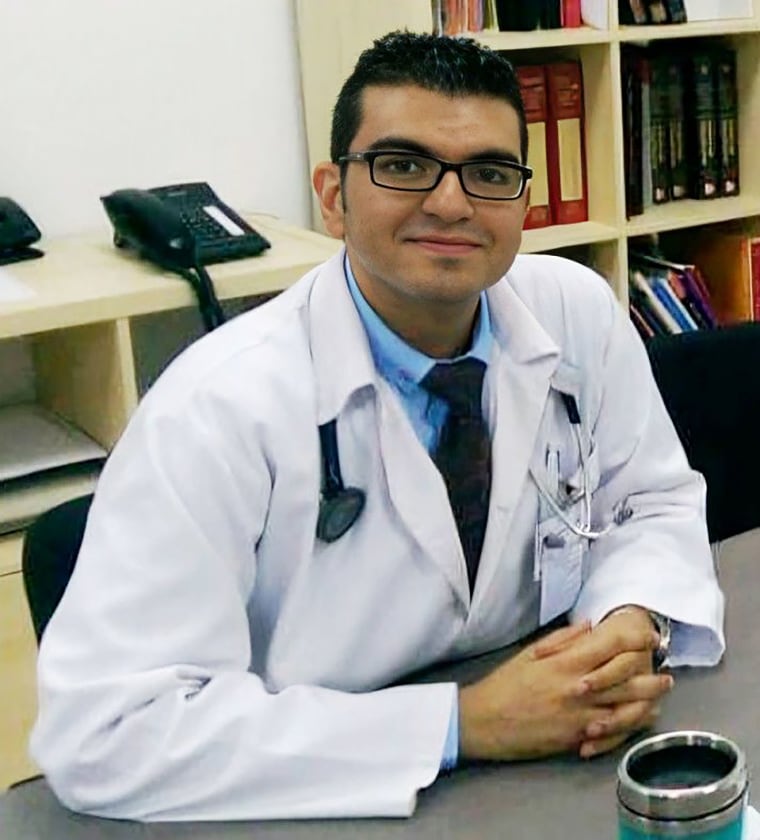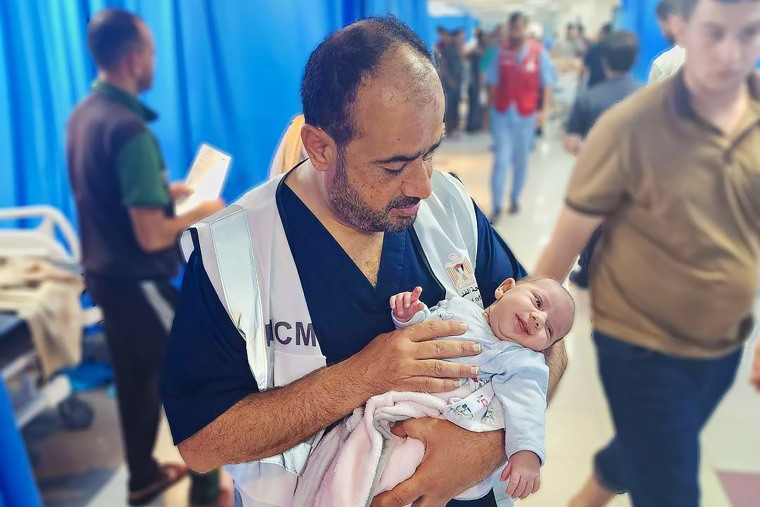Most of his colleagues who stayed at the hospital, he said, were now in prison. Others, like reconstructive surgeon Dr. Ahmad Maqadmeh, were killed inside the Al-Shifa complex, he said.
The 16 health care workers NBC News interviewed all said they believed the Israeli military was deliberately attacking medical facilities and was targeting doctors.
At least 50 specialist doctors, including some of Gaza’s most experienced physicians, have been killed since Israel launched its offensive following Hamas’ Oct. 7 terror attacks and hostage-taking, according to a July 4 list provided by Gaza’s health ministry and NBC News interviews. As of June, at least 20 of Gaza’s 36 hospitals have been destroyed or taken out of commission, according to the World Health Organization.
The Israeli military has repeatedly stated that medical facilities in Gaza are being used as operating bases for Hamas, places to store weapons and as spaces for operatives to hide among the civilian population sheltering in them, an accusation Hamas and health officials in the enclave have denied.
In a statement to NBC News, the Israel Defense Forces said that “a regrettable outcome of Hamas’ exploitation of hospitals” was also the “involvement of medical staff, including doctors, directly in Hamas’ terror activity.” It did not respond when asked if it was targeting doctors in their homes.
None of the doctors NBC News spoke to said they had seen Hamas militants or witnessed terrorist activity within hospital walls. Palestinian health officials and Hamas have repeatedly denied that the militant group has used medical facilities as operational hubs.
In a grim ritual, the doctors have kept track of the deaths and disappearances in a WhatsApp group. It originally started two years ago for doctors to share information. But now, after more than nine months of war in Gaza, it has become a forum to share news about medical professionals and share pictures and videos of hospitals under attack.
Among them is Dr. Ghassan Abu-Sittah. A new notification in the medical WhatsApp group could mean the death of another colleague or friend.
“Every time you get a message from this group, your heart sinks thinking: there’s another piece of bad news,” the U.K.-based plastic surgeon told NBC News in an interview last month at his practice in London. He displayed a message revealing the death of one of his friends.
“Dr. Ahmed Almaqadma is confirmed dead with his mother,” the message read.
Some, he said, had been targeted in their homes. He pointed to the case of Dr. Hammam Alloh, the enclave’s only kidney specialist, who he said he was “was killed within half-an-hour of getting home.” He added that Dr. Medhat Saidam, a senior plastic and reconstructive surgeon at Al-Shifa Hospital, was killed in a strike on his family home, around 30 minutes after he arrived home with his sister.
“Maybe the goal of making Gaza uninhabitable is being achieved here, because the highly qualified, educated class, the people who can afford to leave, are leaving,” he said, adding that some of the doctors coming out of Gaza were a “shadow of their former selves” and “unable to work anymore.”
Medical workers are also being imprisoned by Israeli forces. As of May, 214 medical workers have been detained, the WHO said.
Some have died in custody, including renowned orthopedic surgeon Dr. Adnan al Bursh. He told NBC News after a November raid on Al Shifa Hospital that he was determined to stay put “because there are lots of patients,” including women and children.

He died on April 19 in the Ofer prison in the occupied West Bank, according to both the Gaza health ministry and the United Nations human rights office. In a statement, Tlaleng Mofokeng, the U.N. Special Rapporteur, said his case raised “serious concerns that he died following torture at the hands of Israeli authorities.”
Asked for comment,, the Israel Prison Service deferred NBC News to the Shin Bet, Israel’s domestic security agency. It did not respond. The IDF did not respond to a specific question about the nature of his death.
However, in a statement to NBC News on June 18, the Shin Bet said Dr. Iyad Rantisi, a 53-year-old physician who ran the Maternity department at Kamal Adwan Hospital in the northern city of Beit Lahiya, had died in a “detention center clinic” six days after his arrest on Nov. 11 “on suspicion of his involvement in holding Israeli hostages.” It said the circumstances of his death were being investigated.
Two relatives of Dr. Khaled Al Serr, a general surgery specialist, told NBC News in a phone call last month that they had not heard from him since March 24. Speaking on condition of anonymity for fear of reprisals, they said they didn’t know if he was dead or alive.
Calling for his immediate release, rights group Amnesty International said in a statement last month that he was detained at the Nasser Hospital in the southern city of Khan Younis and had subsequently been “held in conditions that amount to enforced disappearance.”
NBC News reached out several times to the IDF for information on Al Serr’s whereabouts. Its responses did not address the issue of his detention, but instead repeated the accusation that hospitals in Gaza were used by Hamas. The Shin Bet did not respond to a request for information.
Some of those who have been freed have warned of dire conditions behind bars.
After he was released without charge from the Nafha Prison in southern Israel earlier this month, Dr. Mohammed Abu Salmiya, the director of the Al-Shifa hospital, said he had witnessed inmates being treated terribly. Prisoners were “exposed to physical and psychological humiliation on a daily basis,” he told NBC News’ crew on the ground in Gaza in an on-camera interview.

Hiis comments were echoed by a nurse who spoke to NBC News on the condition of anonymity due to the fear of repercussions, who said he was moved to three locations during his time in detention. Prisoners were forced to remain in a sitting position “for 18 to 19 hours a day,” for over a month, he said.
His account closely resembles images broadcast in a February report on Israeli television about a detainee camp in southern Israel showing blindfolded men kneeling in tight rows, surrounded by armed guards.
The nurse said they were beaten, verbally insulted and denied access to food and toilets, and they were regularly interrogated about the whereabouts of Israeli hostages and whether medical workers were members of Hamas.
Like Abu Salmiya, the nurse said that detainees were denied adequate medical care. One prisoner developed gangrene on his right leg and they “amputated his limb below the knee,” he said, adding, “I’m sure his family do not know that their son lost a limb.”
Replacing specialist doctors would likely take years, according to Abu-Sittah, the London based plastic surgeon.
“That is a generational loss that will take us a long time to replace these human resources,” he said, using the example of Dr. Hammam Alloh, trained for six years in medical school, three years of internal medicine and then another six years as a specialist resident in kidney disease before he died in an airstrike in November.
With cease-fire talks ongoing and little sign of the war ending, the number of people requiring treatment is only going to get bigger.
And the deaths of the doctors will have added pressure to the already overburdened health care system in the enclave where health officials say more than 38,700 people have been killed since Israel launched its military offensive in response to the Hamas-led assault in which 1,200 people were killed and over 250 taken hostage, according to Israeli tallies.
Even when the fighting does finish, the United Nations has estimated that it could take as long as 14-years to clear the rubble in the enclave once the Israel offensive is over.
“God willing, we will return to work and rebuild Al Shifa Medical Hospital as it was and better,” the facility’s director Abu Salmiya said.
“And it will be a medical beacon for all our people.”






